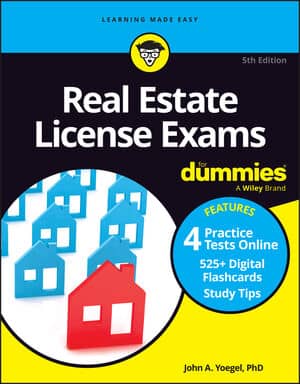You may well wonder why the subject of wills and passing title to property after death is a subject that Real Estate License examiners want you to know something about. After all, wills and estates are subjects better left to attorneys and the courts, right?
Although that is true, real estate agents often are called in to help sell a property that’s left in someone’s estate. Familiarity with some of the terminology and issues that can arise is important. Exam questions focus on very basic information about wills laws of descent or inheritance, and probate.
Wills and real estate
A will is a document that determines how a deceased person’s real property (real estate and the rights that go with it) and personal property (items not permanently attached to real estate) are to be distributed after death. The person for whom the will is drafted is called a testator. Up to the time of death, the testator can dispose of property even if it’s mentioned in the will.
A will takes effect only after death. Anyone who receives title to real estate through a will is known as a devisee; the gift of real property is called a devise. An addition or change to an existing will made by the person for whom the will was written is a codicil.
Laws of descent
When someone dies without a will (intestate), he or she may still have heirs, or people who are entitled to inherit assets from the estate. Someone who dies with a will has died testate.
A good way to remember the difference between “testate” and “intestate” is that “with” is a shorter word than “without,” and “testate” is a shorter word than “intestate.” Someone who died with a will died testate, and someone who died without a will died intestate.
Every state has laws of descent, a statute of descent, or sometimes a law of descent and distribution covering the distribution of the assets of estates when the deceased has no will. Spouses, children, and possibly other relatives are entitled to a portion of the assets of the estate by virtue of their relationship to the deceased.
If your state exam requires you to know about the subject of involuntary loss of property, check out the laws of descent in your state. If your state specifically wants you to know something about the laws of descent, make sure you at least understand the basics of who would get what from an estate if there’s no will.
When people die without a will and without heirs, the state can claim the assets of the estates by something called escheat.
Probate and real estate
Probate is the process of making sure that a will is legal and valid, the deceased’s wishes are carried out, and the assets actually are in the estate. In the case of someone who dies intestate, the court determines who inherits the assets of the estate based on the laws of descent. Both processes take place in surrogate’s court which is sometimes referred to as probate court.
An analogy that may help you remember the name of surrogate’s court is that of a surrogate mother, who simply is someone standing in for the real mother. Surrogate’s court means the court stands in place of the deceased.
During probate proceedings, the court appoints an executor of the estate to carry out the actual distribution of the assets. The executor usually is named in the will. The laws of individual states govern probate proceedings. Generally probate takes place in the county where the deceased person lived and may take place in the county where he or she owned property if different than the county of residence.

